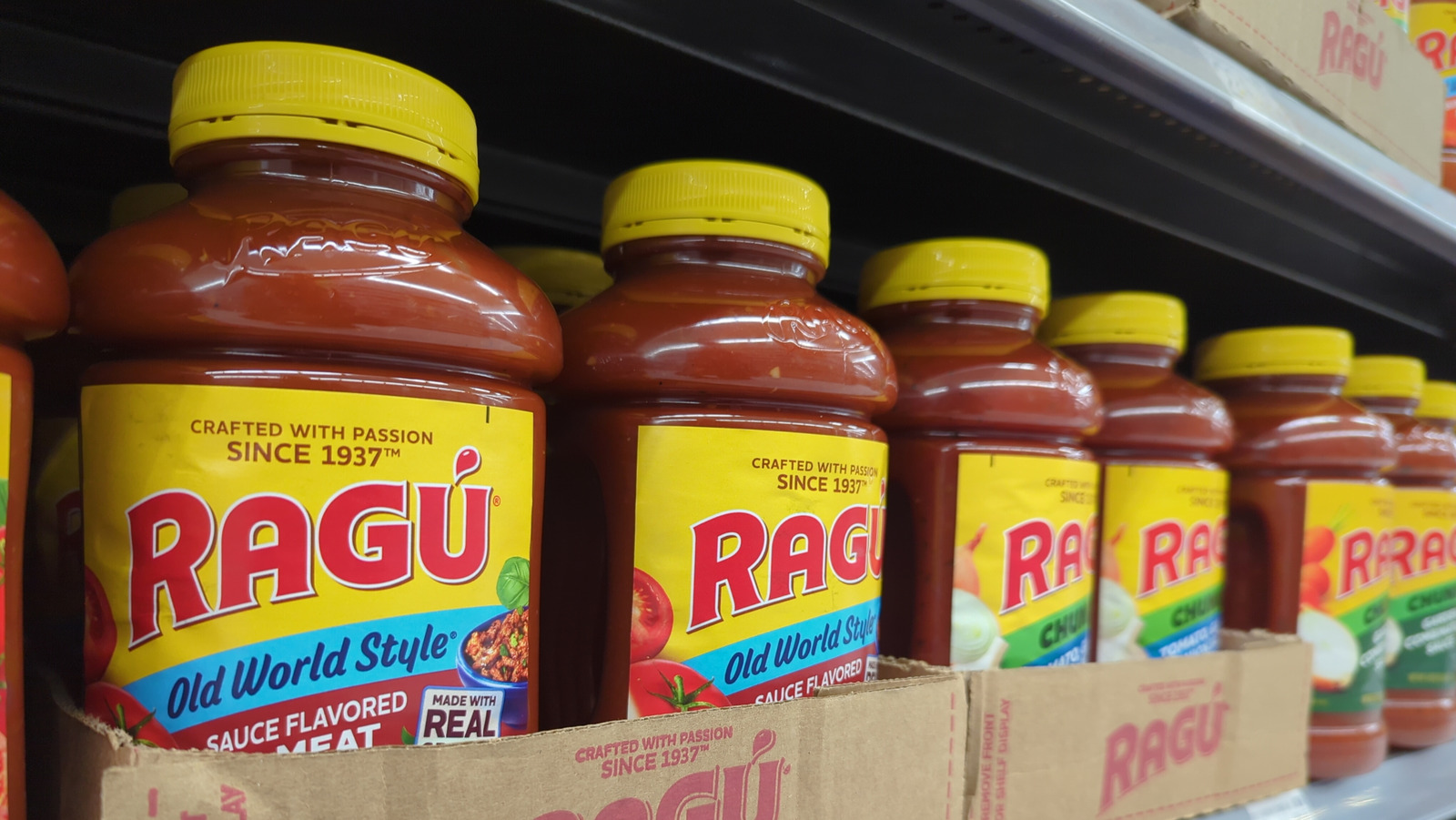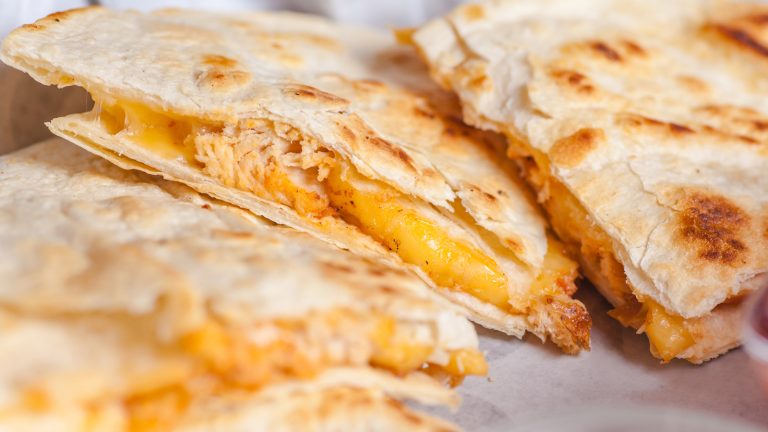We may receive a commission on purchases made from links.
It’s hard to think of a condiment that’s as convenient and versatile as store-bought marinara sauce. This vibrant tomato sauce can be used in tons of dishes, from quick and easy pastas to pizzas, and seafood creations. Plus, the sauce lasts for a long time unopened, is typically affordable, and can be jazzed up with a variety of ingredients. It’s also one of those grocery store buys that many people grab without worrying too much about food safety issues. However, as with many mass-produced products, things can (and sometimes do) go very wrong.
Over the years, a surprising number of marinara sauces have been recalled for reasons ranging from mislabeling to contamination. Several times, sauces were pulled off the shelves because they contained allergens like milk or nuts that weren’t listed. In other cases, there were foreign objects like bits of plastic and glass found in the mix. Then there were some sauces that were moldy or spoiled. Curious to know which companies had to take massive amounts of sauce out of rotation? These are some of the biggest marinara sauce recalls in history.
1. Hudson Harvest Tomato Basil Pasta Sauce in 2024
Founded in 2011, Hudson Harvest works with farmers, millers, and artisans in the Hudson Valley region to distribute local food products to businesses and individuals in several Eastern states. Quality is paramount, not just to ensure that the products meet U.S. Food and Drug Administration (FDA) standards, but also to maintain the company’s reputation. That’s why when the company noticed that some of its bottles of Tomato Basil Pasta Sauce were bulging in June 2024, it issued a voluntary recall of the sauce.
In Hudson Harvest’s official statement, as released by the FDA, it said that the swelling jars were likely a sign that the Tomato Basil Pasta Sauce was under-processed. When that happens, there’s the potential that the product can spoil, causing bacteria to grow. Jars of sauce from the affected batch made their way to 40 retailers in New York, Massachusetts, and Connecticut. Each was notified about the recall and reportedly pulled the sauce from shelves. In total, 243 jars were recalled. Fortunately, there were no reports of anyone falling seriously ill.
2. Wegmans Italian Classics Diavolo Sauce in 2023
Wegmans is a family business that dates back to 1916. From its early days as a humble fruit and vegetable cart, the Wegman family expanded the business into a successful grocery chain with over 100 locations nationwide. It even has its own signature line of products that includes everything from frozen pizza to baked goods and pasta sauces. One of those sauces landed Wegmans in a bit of trouble when a customer complained that it contained an undeclared allergen.
In May 2023, LiDestri Foods (the manufacturer of Wegmans products) issued a recall on jars of Wegmans Italian Classics Diavolo Sauce because the sauce contained anchovies that weren’t accounted for on the label. While anchovies are often added to classic Italian pasta sauces to amp up the umami flavor, all products that contain major allergens like fish, milk, eggs, tree nuts, peanuts, wheat, soybeans, and crustacean shellfish are required by law to state that on the packaging. Apparently, there was an error in the packaging, and that slip up caused Wegmans to pull jars of the mislabeled sauce from stores in eight states and the District of Columbia.
3. Hungryroot Marinara Sauce in 2023
Packaged meal delivery services were all the rage when Hungryroot hit the scene in 2015. The company aimed to offer healthy alternatives to frozen food like veggie noodles and almond chickpea cookie dough. In 2019, the company pivoted to provide grocery products in addition to its ready-to-eat meals. The timing couldn’t have been better, as the pandemic would make at-home grocery ordering a must for many. While the company has grown exponentially since its early days, it had a major hiccup in 2023 when it had to recall a substantial amount of sauce.
In July 2023, BC Gourmet USA, Inc. (the company that made Hungryroot’s sauces) issued a voluntary recall for 81,312 units of Hungryroot Marinara Sauce and 12,840 units of Hungryroot Creamy Vodka Sauce due to the presence of yeast and mold. In total, that worked out to 61,199 pounds of sauce that had been distributed to California, New Jersey, and Indiana. The FDA categorized it as a Class II recall, which it defines as a situation that “may cause temporary or medically reversible adverse health consequences.” Neither Hungryroot nor BC Gourmet USA, Inc. revealed what may have caused the contamination.
4. Scratch Pasta Co. Marinara Sauce in 2023
Since 2017, Scratch Pasta Co. has been selling handcrafted pasta and pasta-related products like olive oils, seasonings, and sauces from its base in Lynchburg, Virginia. The company keeps things simple with fresh, locally sourced ingredients. Take for example the Marinara Sauce, which features a straightforward mix of Italian tomatoes, onions, and butter. Yet, despite its no-nonsense list of ingredients, the sauce had to be pulled from rotation at the end of 2023 due to a labeling error.
Scratch Pasta Co. works with Carolina CoPacking in North Carolina to bottle its sauces. When the North Carolina Department of Agriculture performed an inspection at the facility, it notified the company that milk had to be listed as a major allergen. Because the ingredient list only declared butter made with cream and natural flavor, Carolina CoPacking had to issue a voluntary recall of the sauce. Although the mislabeled sauce had only been shipped to one customer in Virginia, the recall still affected 304 cases, each containing six 24.5-ounce bottles of sauce. That adds up to a total of 1,824 bottles that had to be pulled.
5. Victoria Marinara Sauce in 2019
Established in 1929 Victoria Fine Foods is all about Italian-style pasta sauces that are slow-kettle cooked and made with top-notch ingredients like imported Italian tomatoes and olive oil, fresh garlic, and herbs. In fact, the brand’s mantra is “ingredients come first,” a motto that’s printed on every jar of Victoria sauce. What wasn’t printed anywhere on the labels of one batch of Victoria Marinara Sauce from 2019 was an allergen that could have caused life-threatening problems for people with tree nut allergies.
In February 2019, B&G Foods (the company that acquired Victoria Fine Foods) received a complaint from a customer who had a known cashew allergy stating that the Marinara Sauce had caused an allergic reaction. When B&G Foods tested sauce from that batch, it found traces of cashews and recalled 1,280 cases of the 40-ounce jars. Fortunately, only one batch made at a single plant on a single day was affected. Even so, 19,200 pounds of sauce is no small number to reckon with.
6. Ragú Chunky Tomato Garlic & Onion, Old World Style Traditional, and Old World Style Meat in 2019
It’s hard to think of a more recognizable pasta sauce brand than Ragú. The company was founded during the Great Depression when an Italian-born couple began selling their family pasta sauce from their home in New York. Today, the company is owned by Mizkan America, Inc., which also owns brands like Bertolli and Angostura. In 2019, Ragú fans received some alarming news when it was revealed that some of their favorite pasta sauces might contain plastic fragments.
Mizkan America was alerted to the presence of plastic in certain Ragú sauces during routine quality control checks in June 2019. The sauces that were potentially affected included 45-ounce jars of Ragú Chunky Tomato Garlic & Onion, and 66-ounce jars of the Ragú Chunky Tomato Garlic & Onion, Old World Style Traditional, and Old World Style Meat. The company issued a voluntary recall of those sauces and notified the retailers it had shipped the sauce to nationwide. All up, Mizkan American ended up pulling 9,130 cases from warehouses, distribution centers, and store shelves.
7. Four J Charred Tomato & Basil Sauce in 2018
If you shopped at H-E-B in the late 2010s, you may remember the Four J brand. It was created by four chefs: Joey Campanaro, Jonathan Waxman, Jimmy Bradley, and Jason Giagrande. Together, they created a variety of food products like vinaigrettes, mustard, coffee, and pasta sauce. Four J products first hit shelves in 2016 and were generally well-received. However, in 2018, the company took a hit when it had to recall one of its sauces for containing not one, but three undeclared food allergens.
Four J worked with Cookwell & Company to bring its products to store shelves, and that’s the company that ultimately issued the recall of a particular batch of the Four J Charred Tomato & Basil Sauce. The reason for the recall was that the sauce had been mislabeled and could have potentially contained soy, wheat, and fish. Apparently, the 24-ounce bottles in that batch were only distributed in Texas and there were no reports of anyone getting sick. However, it still resulted in 6,522 units (close to 9,800 pounds) of sauce being taken off the market.
8. Lidia’s Marinara Sauce in 2017
Lidia Bastianich is one of the most celebrated Italian chefs in America. Throughout her lengthy career, she’s shared hundreds of recipes via her cookbooks, television shows, and website, offering advice on everything from perfecting pasta sauce to nailing the perfect steak dinner. She also has her own food company called Nonna Foods that produces her signature pasta sauces. Lidia’s Marinara Sauce gets great reviews despite the fact that a significant number of bottles had to be recalled from multiple states back in 2017.
A simple labeling mistake caused Nonna Foods to issue a voluntary recall of roughly 750 jars of Lidia’s Marinara Sauce in March 2017. Apparently, labels for the marinara sauce were accidentally applied to jars of Lidia’s Vodka Sauce, which contains milk. When the company realized the error, it urged consumers in the 41 states where the sauce was distributed to return it for a full refund. There were no reports of illness, and the sauce’s solid reputation seems to be intact, as you can still buy jars of Lidia’s Marinara Sauce on sites like Amazon, Eataly, and Cento today.
9. Home Maid Ravioli Italian Style Pasta Sauce and pasta products in 2016
Unless you’re from California, and specifically the Bay Area, you may not be familiar with Home Maid Ravioli company. It’s actually been around for ages, having been established in 1949 by the Cresci family in San Francisco. The company creates a wide array of Italian products, including pasta sauces, meatballs, fresh pastas, and ready-made pasta dishes. The company may be small, but it had a pretty massive pasta and sauce recall in 2016.
In many food recall cases, it’s either the companies that issue voluntary recalls or the FDA steps in and orders mandatory recalls when it detects issues. With Home Maid Ravioli, it was the U.S. Department of Agriculture’s Food Safety and Inspection Service (FSIS) that prompted a recall after it reviewed products at a federal plant. The FSIS found that numerous products had not been federally inspected and that some contained undeclared whey and pork. The products included the Italian Style Pasta Sauce, Ravioli and Spaghetti Italian Style Sauce, and numerous packages of pasta in sauce. In total, the company had to recall an eye-watering 38,950 pounds of food.
10. Mama Mancini’s Slow Cooked Italian Style Sauce in 2015
Mama Mancini’s was born in 2008, when Dan Mancini started selling his famous meatballs in marinara sauce that his Italian grandmother taught him to make. A year later, he was featured on the Martha Stewart show, and the company took off from there. The product line eventually expanded to include other ready-made meals and pasta sauce. Unfortunately, the company faced some issues in 2015, when it had to recall significant quantities of pasta sauce and meat products due to misbranding.
In 2015, Joseph Epstein Food Enterprises was the sole manufacturer of Mama Mancini’s products and it was also responsible for third-party laboratory testing. During one testing session, it was found that Mama Mancini’s Slow Cooked Italian Style Sauce and Gluten Free Turkey Meatballs contained excessive gluten beyond the maximum amount allowed for the products to be called gluten-free. Therefore, the company had to recall over 190 pounds of turkey products and 22-ounce cartons of the sauce. Interestingly, two years later, Mama Mancini’s announced it was acquiring Joseph Epstein Food Enterprises.
11. Prego Traditional Italian Sauce in 2013
Prego is another big player in the marinara sauce game. The Campbell’s Company launched the brand in 1981 with a homestyle spaghetti sauce, and it would go on to be a huge hit. Over the decades, the company has added several sauces to the line, including its famous Extra Chunky sauce, Alfredo sauce, and spicy marina sauce. Campbell’s has a pretty good track record when it comes to producing quality Prego products, except for one glitch that took place in 2013.
While doing routine quality control testing in December 2013, The Campbell’s Company (then called Campbell Soup Company) detected possible spoilage in a batch of its Prego Traditional Italian Sauce. A press release went out alerting the public that the company was recalling 300 cases of the 24-ounce bottles that had been shipped to seven states. The company didn’t reveal exactly what the contamination was or how it happened, but it must have been serious enough to warrant writing off such a huge quantity of sauce.
12. Hunt’s Tomato Sauce (regular variety) and Hunt’s Tomato Sauce No Salt Added in 2013
Founded in California in 1888, Hunt’s has spent more than a century building its reputation as a go-to name for all things tomato. From its thick tomato paste to smooth sauces and diced tomatoes, its distinctive red label has become a familiar fixture in countless pantries. So, when the brand’s parent company issued a recall of two types of sauce in 2013, it came as a surprise to many long-time customers who trusted Hunt’s for its quality and consistency.
In January 2013, ConAgra Brands announced that it was voluntarily recalling 8-ounce cans of Hunt’s Tomato Sauce (the regular variety) and Hunt’s Tomato Sauce No Salt Added due to defective cans. The company explained that the inner linings of the cans was the issue, and although it didn’t affect the actual sauce, there was a risk that the cans could expand and the product might burst out. The defective cans were distributed to 12 states, prompting the company to urge customers to either discard the products or return them to the store for a refund.
13. Mazzio’s Marinara Sauce in 2012
With over 100 locations in seven states, it’s safe to say that Mazzio’s is a pretty successful pizza chain. It was founded in 1979 by a former schoolteacher named Ken Solby, who made a name for himself with his thin-crust pizzas featuring a zesty marinara sauce. As Mazzio’s expanded, it needed to keep things consistent across its multiple locations, so the company teamed up with Paradise Tomato Kitchens Inc. to produce pouches of its sauce. Everything seemed to be going swimmingly until 2012, when the sauce got flagged for containing an undeclared allergen.
The issue with Mazzio’s marinara sauce was that the ingredient statement listed butter, but didn’t declare milk as the source of that butter. That’s a red flag for the FDA, which requires all major allergens to be listed on food packaging. Unfortunately for Mazzio’s, that meant that the company had to recall 6,352 cases of the sauce, each of which contained six pouches of sauce weighing in at 6.65 pounds a pop. That works out to roughly 253,445 pounds of sauce that had to be pulled.
14. Acme Traditional Spaghetti Sauce in 2005
It’s no secret that store-bought pasta sauce can save you money, which is why so many of us stock up on cans of reasonably priced spaghetti sauce for those times when we want a quick, no-fuss pasta dish. Generally speaking, you can expect a few key ingredients in your average canned or jarred pasta sauce, including tomatoes, herbs like basil or oregano, garlic, and salt. What you definitely don’t want is pieces of plastic and glass, two items that surfaced in jars of Acme’s Spaghetti Traditional Sauce in 2005.
With a history that dates back to 1891, Acme Markets grew from a single store in Philadelphia to over 150 supermarkets in six Northeastern states. In 1999, Albertsons Companies acquired the chain, and it was Albertsons, Inc. that issued the massive 2005 recall. There isn’t a lot of information about how the pieces of glass and plastic ended up in the Spaghetti Traditional Sauce, but what we do know is that the company had to pull 34,534 pounds of sauce from Acme store shelves in four states.





